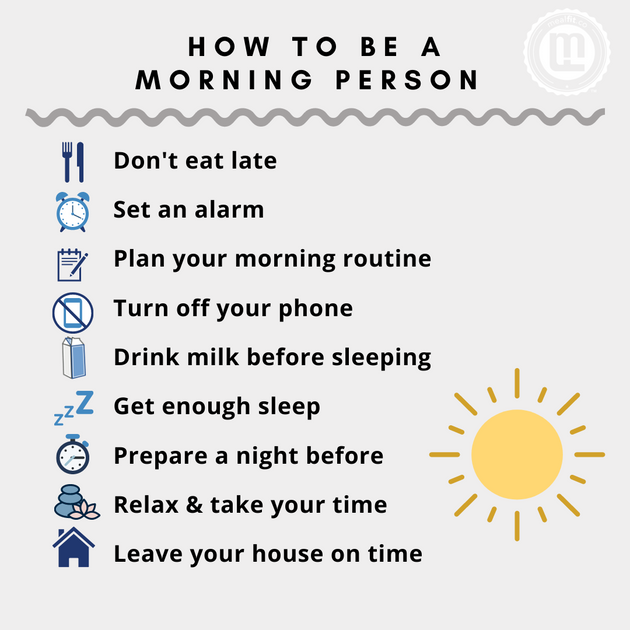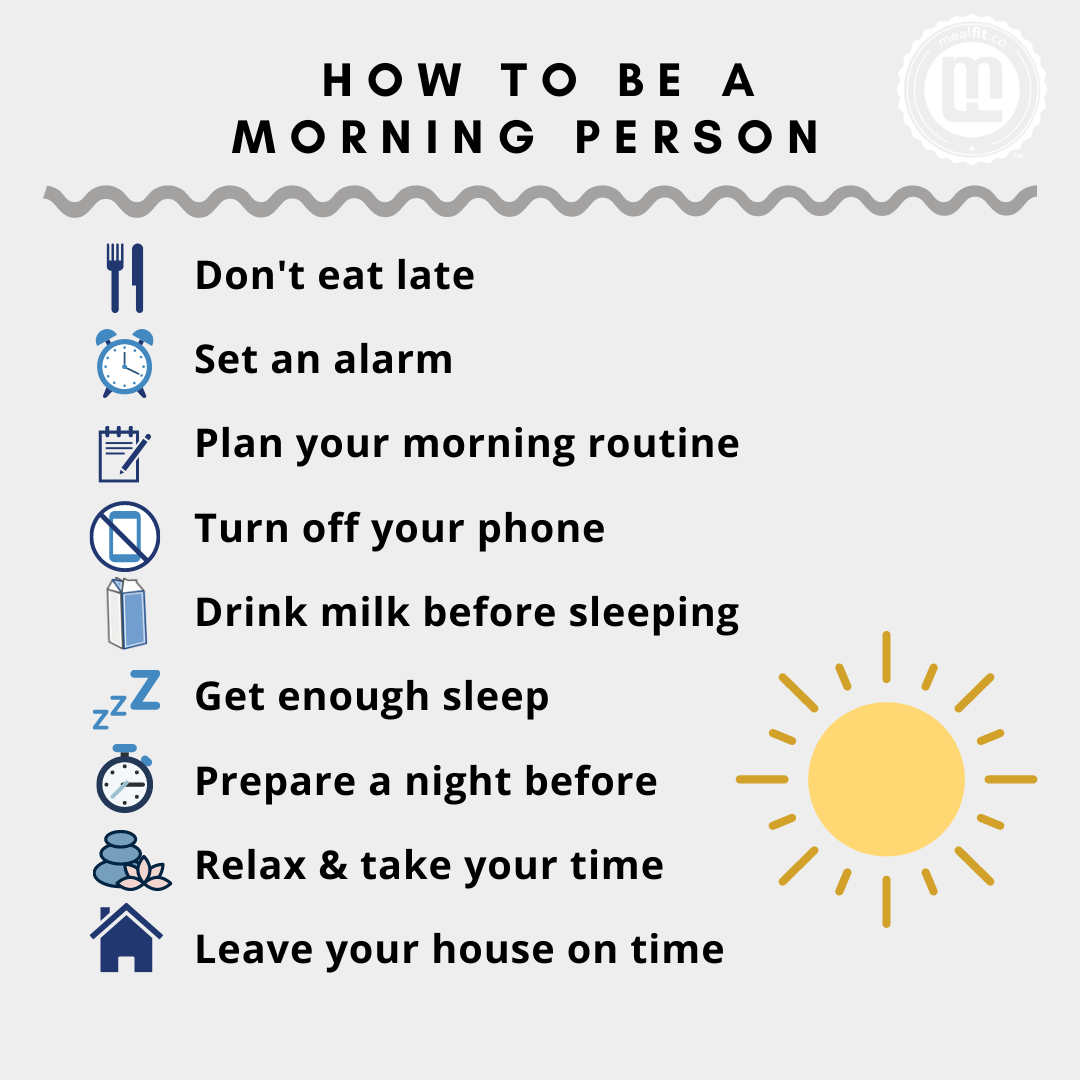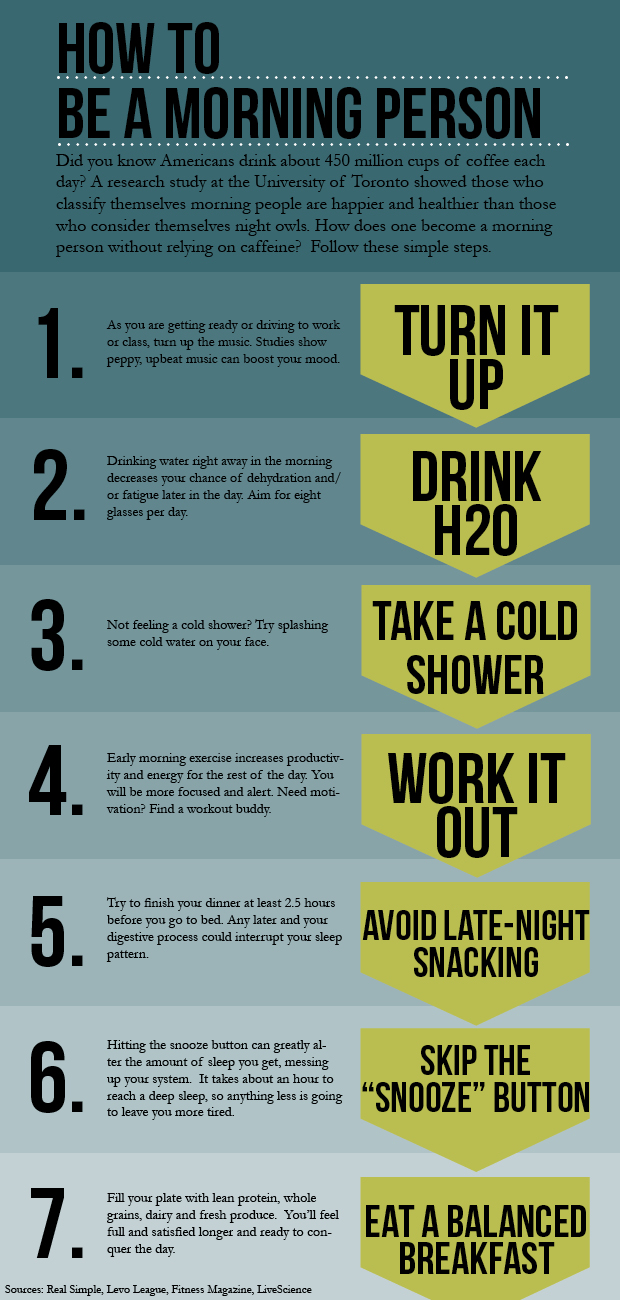Are you tired of waking up feeling groggy and sluggish every morning? Do you envy those who jump out of bed, ready to seize the day with energy and enthusiasm?
You’re not alone. Many people struggle with mornings, but the good news is you can become a morning person and transform your daily routine. Imagine starting each day with a burst of energy, ready to accomplish your goals and enjoy life to the fullest.
You’ll discover simple yet powerful strategies to help you embrace mornings like never before. Keep reading to unlock the secrets that could change your life and set you on a path to brighter, more productive days.
Benefits Of Being A Morning Person
Starting your day early can improve productivity and boost mood. Morning people often enjoy quieter environments, making it easier to focus. Adopting a morning routine can lead to better sleep quality and healthier habits.
Becoming a morning person can transform your life in many positive ways. Waking up early doesn’t just mean more time in your day; it can enhance your overall well-being. Let’s explore some of the key benefits that you might experience by making this shift.
Increased Productivity
Early risers often find they have more energy and focus to tackle tasks efficiently. Mornings are typically quieter, allowing you to work without distractions. Have you ever noticed how much you can accomplish when the world is still waking up? Think about starting your day with a clear agenda. This can set a productive tone for the rest of the day. You might even find yourself completing tasks faster and with better results.
Improved Mental Health
Waking up early can contribute to better mental health. More time in the morning allows you to start your day at a relaxed pace, reducing stress. Imagine having the luxury to sip your coffee slowly or enjoy a peaceful walk before your day begins. Morning routines can also include activities that boost your mood, like meditation or journaling. Consistently feeling in control of your mornings may lead to a more positive outlook on life.
Better Physical Health
Morning people often make healthier choices throughout the day. With extra time in the morning, you can prioritize a nutritious breakfast and plan your meals. Did you know that early risers are more likely to exercise regularly? Regular morning exercise can boost your energy levels and improve sleep quality. Think about how much better your body will feel with consistent physical activity as part of your morning routine. Embracing mornings can enrich various aspects of your life. Could becoming a morning person be the key to unlocking your full potential?

Credit: www.mealfit.co
Creating A Morning Routine
Waking up early can be challenging, but a consistent morning routine helps. Start by setting a fixed wake-up time. Gradually introduce activities like stretching or a healthy breakfast to make mornings enjoyable.
Creating a morning routine can transform your day. It helps set a positive tone. By organizing your morning, you start with purpose. A structured routine reduces stress. It also improves focus and productivity. Here are key elements to include in your routine.
Setting A Consistent Wake-up Time
Waking up at the same time daily is crucial. It regulates your body’s internal clock. Consistent wake-up times improve sleep quality. You feel more refreshed and alert. Start by setting your alarm for the same time. Even on weekends. Gradually adjust your bedtime too. This ensures enough rest each night.
Incorporating Exercise
Exercise boosts energy levels. It also enhances mood. Morning workouts jumpstart your day. You feel more awake and ready. Choose an activity you enjoy. Jogging, yoga, or a brisk walk. Aim for at least 20 minutes. Exercise also helps with weight control. And it strengthens your heart.
Mindfulness Practices
Mindfulness clears your mind. It reduces stress and anxiety. Start with simple breathing exercises. Or try meditation for a few minutes. Focus on the present moment. This practice increases awareness. It also promotes emotional health. You start your day with a calm mindset. Ready to face any challenges.
Optimizing Your Sleep Environment
Becoming a morning person can significantly enhance your productivity and mood. One of the foundational aspects of achieving this goal is optimizing your sleep environment. A well-designed sleep space can make waking up early a much smoother experience. Let’s dive into some key elements you can adjust to improve your sleep quality.
Choosing The Right Mattress
Your mattress plays a crucial role in how well you sleep. A comfortable mattress provides the right support for your body, reducing aches and pains. Consider your sleeping position: side sleepers might prefer softer mattresses, while back sleepers often benefit from firmer options.
Test different types before purchasing. You spend nearly a third of your life in bed, so investing time in finding the right mattress pays off. Don’t be afraid to ask for recommendations or reviews to guide you.
Managing Light And Sound
Light and sound can be your sleep’s worst enemies. Ensure your room is as dark as possible; blackout curtains can help. A sleep mask might be an easy solution if you can’t control light sources.
Soundproofing your room or using earplugs can drown out disruptive noises. Consider a white noise machine to create a soothing soundscape conducive to sleep.
Temperature Control
Temperature is often overlooked but can greatly affect sleep quality. Aim to keep your room cool, between 60 to 67 degrees Fahrenheit. This range is ideal for most people.
Use breathable fabrics for bedding to avoid overheating. A fan or air conditioning can help regulate the room temperature more efficiently.
How does your current sleep environment measure up? Assess and make adjustments to improve your sleep quality, paving the way for you to become a true morning person.

Credit: www.mealfit.co
Diet And Nutrition For Early Risers
Transforming into a morning person starts with what you eat. Foods play a big role in how you feel in the morning. Eating well supports waking up early, feeling fresh, and staying energized. Discover how to tweak your diet for better mornings.
Breakfast Ideas
Start with a balanced breakfast. Include proteins like eggs or yogurt. Add whole grains such as oatmeal. Fruits provide natural sugars and vitamins. Try berries or bananas. These foods help boost energy and focus.
Hydration Tips
Water is essential for alertness. Drink a glass of water first thing. It kickstarts your metabolism. Herbal teas are also beneficial. They hydrate and refresh. Avoid sugary drinks. They might lead to energy crashes later.
Avoiding Late-night Snacks
Late-night snacks disrupt sleep. They cause digestion issues and lower energy levels. Opt for lighter evening meals. Choose salads or soups. These are easier to digest. Enjoy a warm chamomile tea to relax before bed.
Building A Nighttime Routine
Establishing a nighttime routine can help you become a morning person. Consistent sleep schedules improve energy and focus. Consider reading or meditating before bed for better rest.
Building a nighttime routine is crucial for anyone looking to become a morning person. Consistency in your evening habits can set the stage for a restful night’s sleep. With the right routine, you’ll wake up feeling refreshed and ready to tackle the day.
Relaxation Techniques
Wind down with calming activities that signal to your body it’s time to rest. Try deep breathing exercises, gentle yoga, or listening to soothing music. A friend of mine swears by reading a chapter of a book every night to ease into sleep mode. Experiment with different techniques to find what helps you relax most effectively. Could a warm bath or a cup of herbal tea be your secret weapon against a restless night?
Limiting Screen Time
Screens emit blue light that can interfere with your sleep cycle. Aim to switch off devices like phones, tablets, and laptops at least an hour before bed. Instead of scrolling through social media, consider picking up a hobby that doesn’t involve screens. Try writing in a journal or meditating. How much better would you feel waking up after a night of uninterrupted rest rather than one filled with notifications?
Preparing For The Next Day
Simplify your morning by organizing the night before. Lay out your clothes, pack your bag, and plan your breakfast. A colleague of mine finds that jotting down a quick to-do list for the next day makes mornings less stressful. Being prepared the night before can make waking up early feel less daunting. What if the secret to becoming a morning person lies in how you spend your evenings?
Overcoming Common Challenges
Becoming a morning person can be tough. Many face common hurdles. These include sleep inertia, motivation issues, and social obligations. Understanding these challenges can help you tackle them. Let’s dive into some strategies.
Dealing With Sleep Inertia
Waking up can feel like a foggy task. This is sleep inertia. It makes you groggy and slow. To fight this, let sunlight in. Natural light signals your body to wake up. Stretching can also help. It boosts blood flow and energy.
Staying Motivated
Staying motivated is crucial for morning routines. Set clear goals for your mornings. This gives purpose and focus. Reward yourself for waking up early. Maybe a nice breakfast or a walk. Keep a journal to track your progress. It helps you see improvements.
Managing Social Obligations
Evening plans can disrupt morning routines. Try to schedule them wisely. Choose early gatherings if possible. Explain your goals to friends and family. They might support your new routine. Limit late-night screen time. It can delay sleep and affect mornings.
Tracking Progress And Adjustments
Tracking your progress helps you become a morning person effectively. It’s about understanding your habits and making the right changes. By monitoring and adjusting, you can see what’s working and what isn’t. This process will guide you towards better mornings.
Monitoring Sleep Patterns
Keep a sleep diary to understand your habits. Write down when you go to bed and wake up. Note how long it takes to fall asleep. This helps identify any patterns or problems. Use sleep tracking apps for more detailed insights. They can show sleep quality and disturbances.
Evaluating Energy Levels
Pay attention to your energy throughout the day. After waking up, assess how you feel. Record your energy levels in the morning, afternoon, and evening. This can show if your sleep changes are effective. Use a simple rating scale for easy tracking.
Adapting Your Routine
Change your routine based on what you learn. If you need more sleep, go to bed earlier. Adjust wake-up times for better energy levels. Tweak your morning activities to boost alertness. Small changes can have a big impact on your mornings.

Credit: www.tommiemedia.com
Frequently Asked Questions
How Can I Start Waking Up Early?
To start waking up early, set a consistent bedtime and wake-up schedule. Gradually adjust your sleep time by 15-minute increments. Avoid electronic devices before bed and create a relaxing bedtime routine. Ensure your sleep environment is comfortable and dark. Over time, your body will adapt to the new schedule.
What Are The Benefits Of Being A Morning Person?
Being a morning person can boost productivity and mental health. It allows for quiet, uninterrupted time to focus on goals. Morning sunlight exposure can improve mood and energy levels. Additionally, early risers often experience better sleep quality, leading to improved overall well-being and a more balanced lifestyle.
How Can I Adjust My Sleep Schedule?
To adjust your sleep schedule, make gradual changes. Shift your bedtime and wake time by 15 minutes daily until desired times are reached. Maintain a consistent schedule, even on weekends. Prioritize good sleep hygiene by avoiding caffeine and electronics before bed.
This helps your body naturally adjust to the new routine.
What Should I Eat For A Morning Energy Boost?
For morning energy, eat a balanced breakfast with protein, fiber, and healthy fats. Include foods like eggs, whole-grain toast, and avocado. Add fruits or nuts for additional nutrients. Avoid sugary cereals and pastries. A nutritious breakfast helps stabilize blood sugar levels and provides sustained energy throughout the morning.
Conclusion
Becoming a morning person takes time and patience. Start with small changes. Go to bed earlier. Set a consistent wake-up time. Create a calming bedtime routine. Limit screen time before sleep. Enjoy a healthy breakfast. Morning exercise boosts energy. Consistency builds new habits.
Celebrate small successes along the way. Gradually, mornings will feel easier. You’ll enjoy the quiet start to your day. Embrace the peace and productivity. Soon, being a morning person will become natural. Enjoy your new morning routine!
